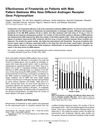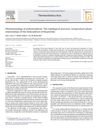Search
for
Sort by
Research
60-90 / 1000+ resultsresearch The Role of CYP19A1 and ESR2 Gene Polymorphisms in Female Androgenetic Alopecia in the Polish Population
No significant link was found between the studied genes and female hair loss in the Polish population.

research Androgen Receptor Gene (CAG)n and (GGN)n Length Polymorphisms and Symptoms in Young Males with Long-Lasting Adverse Effects After Finasteride Use Against Androgenic Alopecia
Gene differences affect finasteride side effects in men with hair loss.

research Androgen Receptor Polymorphisms (CAG Repeat Lengths) in Androgenetic Alopecia, Hirsutism, and Acne
Shorter CAG repeats may cause hair and skin issues, while longer ones may link to acne.

research Baldness And The Androgen Receptor: The AR Polyglycine Repeat Polymorphism Does Not Confer Susceptibility To Androgenetic Alopecia
AR polyglycine repeat doesn't cause baldness.

research Significance of the Polyglutamine Tract Polymorphism in the Androgen Receptor
The length of the CAG repeat in the androgen receptor gene affects the risk and progression of prostate cancer, BPH, infertility, and undermasculinized genitalia.

research Androgen Receptor Gene Polymorphism and Polycystic Ovary Syndrome
The conclusion is that androgen receptor gene polymorphism might be a marker for polycystic ovary syndrome, but more research is needed.

research Androgen Receptor Gene CAG Repeat Polymorphism in Women with Polycystic Ovary Syndrome
Longer CAG repeat lengths in the androgen receptor gene are linked to higher testosterone levels in women with PCOS.

research CAG Repeat Testing of Androgen Receptor Polymorphism: Is This Necessary for the Best Clinical Management of Hypogonadism?
Testing for CAG repeat polymorphism in the androgen receptor gene is not currently recommended for managing hypogonadism.

research The VEGF +405 G>C 5' Untranslated Region Polymorphism and Risk of PCOS: A Study in South Indian Women
The VEGF +405G allele may increase the risk of PCOS in South Indian women.

research Testosterone Levels in Relation to Oral Contraceptive Use and the Androgen Receptor CAG and GGC Length Polymorphisms in Healthy Young Women
Oral contraceptives lower testosterone levels in women, especially those with certain genetic traits, and may be linked to increased breast cancer risk.

research Effectiveness of Finasteride on Patients with Male Pattern Baldness Who Have Different Androgen Receptor Gene Polymorphism
Finasteride works better for baldness in people with shorter gene repeats.
research Association Between Interleukin 18 Polymorphisms and Alopecia Areata in Koreans
Certain genetic variations in IL18 may increase the risk of alopecia areata in Koreans.
research Efficacy of Metformin Therapy in Adolescent Girls with Androgen Excess: Relation to Sex Hormone-Binding Globulin and Androgen Receptor Polymorphisms
Metformin works better for adolescent girls with PCOS who have certain genetic variations.

research Association of AR rs6152G/A Gene Polymorphism With Susceptibility to Polycystic Ovary Syndrome in Chinese Women
A certain gene variant may increase the risk of polycystic ovary syndrome in Chinese women.

research Analysis of Genetic Polymorphisms of Steroid 5α-Reductase Type 1 and 2 Genes in Korean Men with Androgenetic Alopecia
Gene differences may affect baldness treatment response in Korean men.

research Anti-Müllerian Hormone Gene Polymorphism Is Associated With Androgen Levels in Chinese Polycystic Ovary Syndrome Patients With Insulin Resistance
Certain gene variations are linked to higher male hormone levels in Chinese women with PCOS and insulin resistance.

research Association of Single Nucleotide Polymorphisms in the RAB5B Gene 3′UTR Region with Polycystic Ovary Syndrome in Chinese Han Women
Certain genetic variations in the RAB5B gene are linked to a higher risk of polycystic ovary syndrome in Chinese Han women.

research Association Between Polymorphisms of OCT1 and Metabolic Response to Metformin in Women with Polycystic Ovary Syndrome
Certain genetic variations in OCT1 may improve insulin sensitivity with metformin in women with PCOS.

research Androgenetic Alopecia and Polymorphism of the Androgen Receptor Gene (SNP rs6152) in Patients with Benign Prostate Hyperplasia or Prostate Cancer
Hair loss gene linked to prostate issues.

research A Functional Polymorphism in Interleukin-1α (IL1A) Gene Is Associated with Risk of Alopecia Areata in Chinese Populations
A certain genetic variation in the IL1A gene may lower the risk of a hair loss condition in Chinese people.
research Association Between IL16 Gene Polymorphisms and Susceptibility to Alopecia Areata in the Korean Population
IL16 gene variations may affect the risk of alopecia areata in Koreans.

research Androgen Receptor Polymorphism-Dependent Variation in Prostate-Specific Antigen Concentrations of European Men
Certain genetic variants in the androgen receptor are linked to higher PSA levels, potentially affecting prostate cancer screening outcomes.

research Phenomenology of Polymorphism: The Topological Pressure–Temperature Phase Relationships of the Dimorphism of Finasteride
Finasteride's two forms have different stability based on temperature and pressure.

research The Androgen Receptor Gene Polyglycine Repeat Polymorphism Is Associated With Memory Performance In Healthy Chinese Individuals
Certain gene variations are linked to better memory in healthy Chinese women.

research HSD3B1 Gene Polymorphism and Female Pattern Hair Loss in Women with Polycystic Ovary Syndrome
HSD3B1 gene variant and being overweight linked to hair loss in women with polycystic ovary syndrome.

research Association of Single Nucleotide Polymorphisms in the CYP19A1 Gene with Female Pattern Hair Loss in a Chinese Population
Two gene variations, rs6493497 and rs7176005, may be linked to female hair loss in Chinese people.
research ACE1 rs1799752 Polymorphism Is Not Associated With Long-COVID Symptomatology In Previously Hospitalized COVID-19 Survivors
The ACE1 gene variant doesn't affect long-COVID symptoms.

research Role of ACE2 Polymorphism in COVID-19: Impact of Age
Different ACE2 gene versions may affect COVID-19 impact based on age and suggest some hair loss drugs could be potential treatments.

research Association Between VEGF Gene Polymorphisms (11 Sites) and Polycystic Ovary Syndrome Risk
Certain changes in the VEGF gene can increase or decrease the risk of polycystic ovary syndrome.